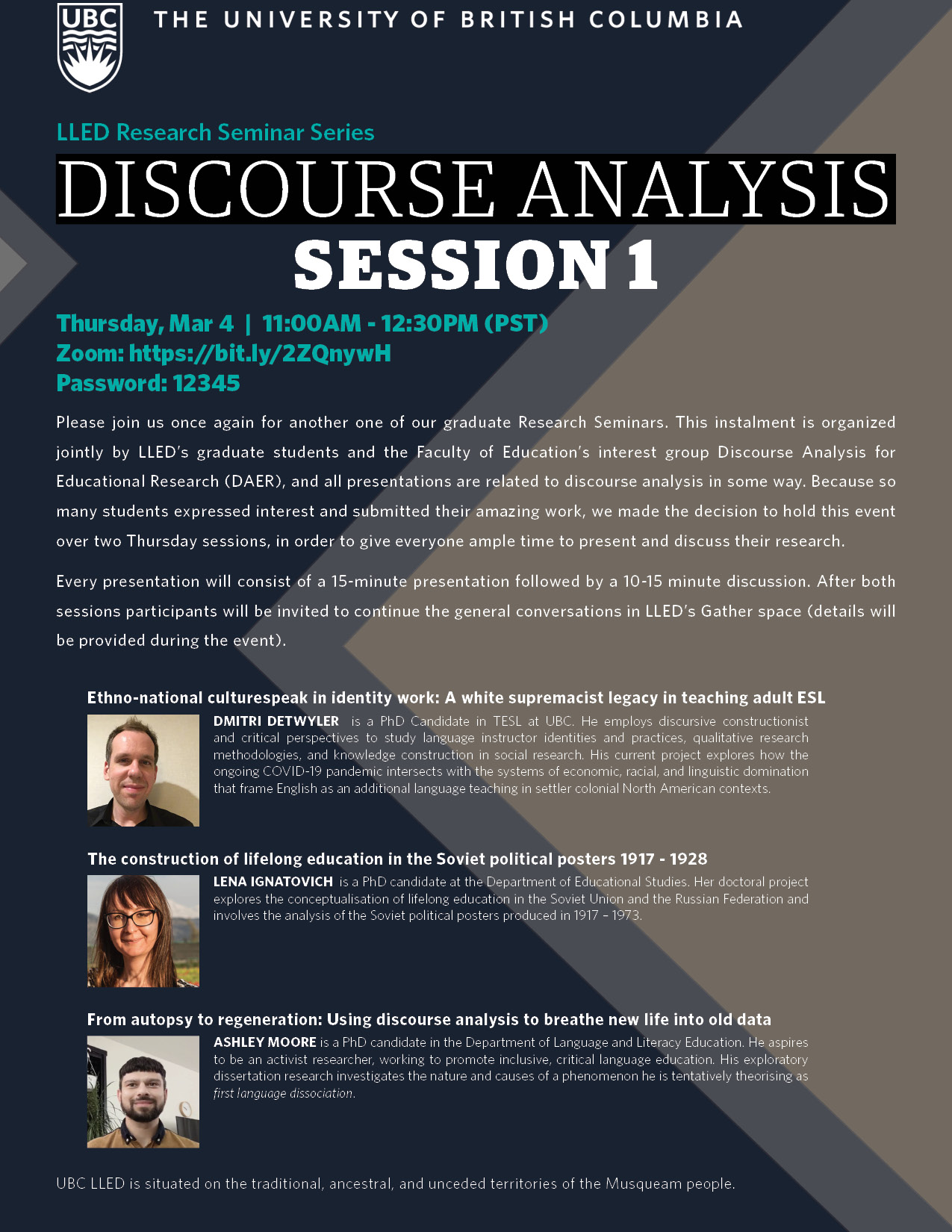Session 1: Thursday, March 4th, 2021 | 11:00 AM – 12:30 PM PST
Session 2: Thursday, March 11th, 2021 | 11:00 AM – 12:30 PM PST
Presenters:
Session 1: Dmitri Detwyler, Lena Ignatovich, Ashley Moore
Session 2: Takeshi Kajigaya, Dorna Rahimi
Online via Zoom: https://ubc.zoom.us/j/61103398405?pwd=eWFEVkptSWp6SVM3OVdRVGNqNzd3UT09
Password: 12345
Please join us once again for another one of our graduate Research Seminars. This instalment is organized jointly by LLED’s graduate students and the Faculty of Education’s interest group Discourse Analysis for Educational Research (DAER), and all presentations are related to discourse analysis in some way. Because so many students expressed interest and submitted their amazing work, we made the decision to hold this event over two Thursday sessions, in order to give everyone ample time to present and discuss their research.
Every presentation will consist of a 15-minute presentation followed by a 10-15 minute discussion. After both sessions participants will be invited to continue the general conversations in LLED’s Gather space (details will be provided during the event).
Session 1
Ethno-national culturespeak in identity work: A white supremacist legacy in teaching adult ESL
In this talk, based on my dissertation research, I will show how three adult ESL instructors in Canada regularly drew on the notion of ethno-national cultures to perform professional identities in research interviews. I locate these discursive practices in the larger patterns of racio-linguistic domination perpetuated by “culturespeak” and popular discourses about interculturality to argue that recognizing and changing such talk is a small but necessary step for decolonizing the fields of TESL and applied linguistics and achieving justice for minoritized learners.
Dmitri Detwyler is a PhD Candidate in TESL at UBC. He employs discursive constructionist and critical perspectives to study language instructor identities and practices, qualitative research methodologies, and knowledge construction in social research. His current project explores how the ongoing COVID-19 pandemic intersects with the systems of economic, racial, and linguistic domination that frame English as an additional language teaching in settler colonial North American contexts.
The construction of lifelong education in the Soviet political posters 1917 – 1928
In her presentation, Lena will discuss the reasons behind including the Soviet political posters in her study, the employed theoretical and methodological framework, and the selected data. She will also share some challenges that she experienced with data analysis and preliminary outcomes of her study.
Lena Ignatovich is a PhD candidate at the Department of Educational Studies. Her doctoral project explores the conceptualisation of lifelong education in the Soviet Union and the Russian Federation and involves the analysis of the Soviet political posters produced in 1917 – 1973.
From autopsy to regeneration: Using discourse analysis to breathe new life into old data
At every step in the research process—from the first ding of an idea, to the final publication of a study—researchers make countless decisions that shape what unfolds, and each decision is entangled in (un)conscious bias, social practices, the épistémè, networks of power and so on. In this presentation, I’ll use my own interview transcripts to show how we can return to interactional data from “completed” studies and perform a methodological autopsy, turning up the analytic resolution, applying different discourse analysis tools, and revealing layers of insight that our methodological decisions foreclosed the first time around.
Ashley R. Moore is a PhD candidate in the Department of Language and Literacy Education. He aspires to be an activist researcher, working to promote inclusive, critical language education. His exploratory dissertation research investigates the nature and causes of a phenomenon he is tentatively theorising as first language dissociation.
Session 2
Unraveling the motivation behind the all-English policy for junior high schools in Japan: Intertextual analysis for a transparent policy making process
In this presentation, I showcase part of the preliminary analysis of the English-only policy making process for Japanese junior high schools. By employing intertextual analysis informed by Critical Discourse Studies, I will argue that the government gradually understated the direct relationship between the English-only policy and its potential for economic development, and alternatively emphasized values of the policy for better English language education.
Takeshi Kajigaya is a second-year PhD student in LLED. His research interests include language ideology and language educational policy. He is particularly interested in policy making process and policy implementation from interdisciplinary perspectives between political science and applied linguistics.
“I am so grateful but…”: A discursive analysis of the function of neoliberal multiculturalism in discussing immigration experiences
This study uses discursive analysis to analyze the interviews conducted with immigrant parents regarding their experiences in their child’s school. Looking at immigrant-related discourses, neoliberal multiculturalism perpetuates the distinction between “deserving” and “undeserving” immigrants (Kubota, 2014). The ideologies of the “good” and “grateful” immigrants are complicit in neoliberal multiculturalism ideologies; good and grateful immigrants are expected to be independent, resourceful, and compliant with the political and public structures. Using discursive analysis, the presenter will discuss using this methodology and the relevant findings and their implications.
Dorna Rahimi is a doctoral candidate in the School and Applied Child Psychology program at the faculty of Education. In the past few years, Dorna has been learning about applying discourse analysis to her work and has been involved in the Discourse Analysis Research Group. Her research interest focuses on employing critical discursive psychology in analyzing immigrant parents’ and psychologists’ interactions.

